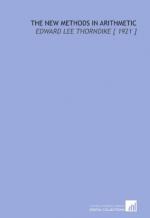|
This section contains 6,821 words (approx. 23 pages at 300 words per page) |

|
SOURCE: “From Laws of Learning to a Science of Values: Efficiency and Morality in Thorndike's Educational Psychology,” in American Psychologist, Vol. 53, No. 10, October, 1998, pp. 1145-52.
In the following essay, Beatty discusses the ways in which Thorndike developed and then marketed his notions about using scientific methodology in educational psychology to create an empirical way of measuring morality and character.
In the first sentence of the expanded 1911 edition of Animal Intelligence Edward L. Thorndike listed “intellect” and “character” (Thorndike, 1911, p. 1) as the two topics of behavioristic psychology. Thorndike researched and reworked these themes throughout the successive phases of his long career. Following his path-breaking animal experiments, he found employment in teacher education. He briefly explored G. Stanley Hall's child study, but rejected developmentalism on intellectual, methodological, and moral grounds and began measuring individual differences. In the years before World War I, Thorndike combined learning theory, psychometrics, and applied research...
|
This section contains 6,821 words (approx. 23 pages at 300 words per page) |

|


